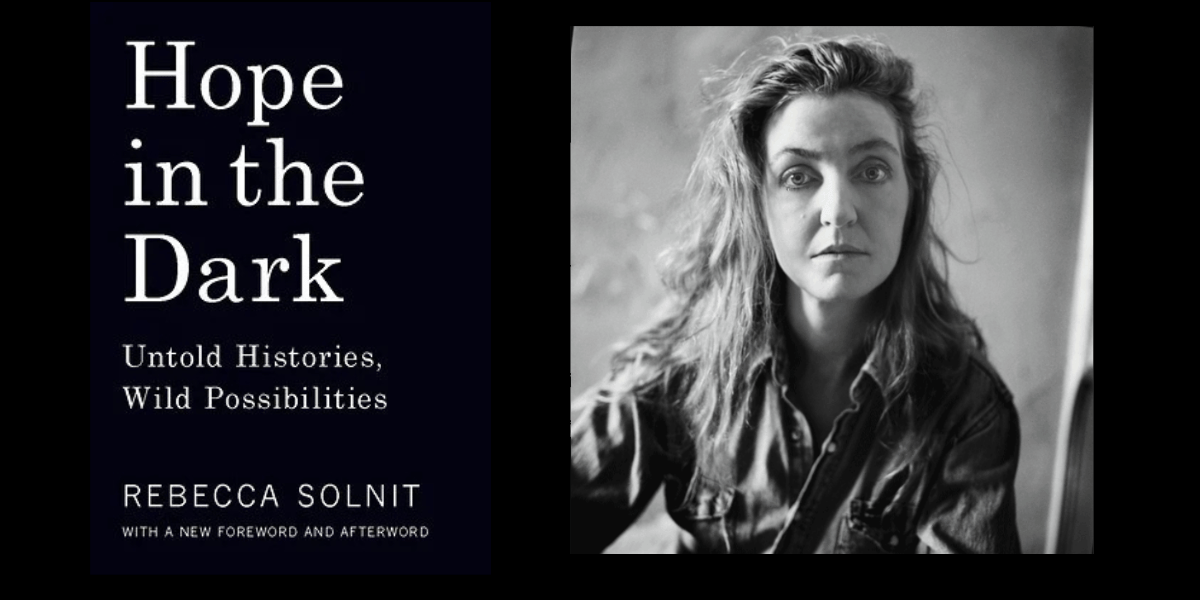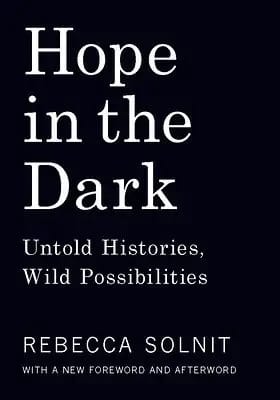Rebecca Solnit on How to Hope in the Dark
For many, we're in a moment right now that feels crushing.
A moment where the future feels so dark that it's almost easier not to think about it.
Until the Saturday preceding the election, I did not think Kamala would win. Whether I finally allowed myself to hope or bought into what the political polls were selling, I don’t know. What’s true is I didn’t believe, and then I did.
Now, following the results, I’m struggling with a mix of fear, incredulity, and frustration. It's easy to feel that everything I believe in—change, empathy, progress—is slipping away.
I know I’m not alone in feeling the weight of it all, and neither are you.
One voice I turn to in times of absolute despair is the author, cultural critic, and hope-tivist, Rebecca Solnit.
Known for works like Men Explain Things to Me (whose main essay launched the word “mansplaining” into the zeitgeist), Solnit published a book in 2004 called Hope in the Dark. In it, she presents a bold argument for hope, not as wishful thinking, but as a radical commitment to keep acting, even in a world whose future is hazy and unpredictable.
The book, updated in 2016, holds up, proving that hope is eternal. Solnit offers an antidote to the despair that often grips those striving for change, especially when their focus lands more on losses than hard-won victories or the unimaginable progress.
Drawing from decades of activism and deep engagement with environmental, cultural, and political history, she reminds us of the overlooked legacy of transformative wins that those working for change have achieved. The positive impacts of our actions aren't always obvious, directly measurable, or immediate, and giving in to despair is often a sign of overconfidence about what's to come.
Solnit's book is about the kind of hope you have to fight for, even in the most discouraging times. Written after another era of political setbacks, it speaks to the depths of despair, showing how, historically, movements and individuals who kept going—even when they couldn't see the path ahead—could make change in ways they never anticipated.
Her hope isn’t rooted in certainty or guarantees—what is? It's rooted in a commitment to keep acting, pushing, and caring—even when the outcomes feel foggy, distant, or impossible to imagine.
With a historian’s keen eye, she argues that many of the most significant victories come from movements that persevered without knowing they’d succeed.
Hope, in her view, is a way of seeing that what we do now matters, even if the effects aren't immediately apparent. Solnit makes a case for hope as a choice to keep moving forward and keep nudging the world in a better direction, especially when our current path feels bleak. She writes with a clarity that lets you feel your courage rise, word by word.
Despair is often a shortcut—a kind of surrender to our pessimism. Change is rarely straightforward, and history surprises us in good and bad ways. Staying committed to your beliefs can, in time, yield results that are often unpredictable, and sometimes astonishing.
Giving up because we lost to something uniquely dangerous makes that danger our reality. We must fight back at every turn, and to do that, we must hope (and believe) that one day goodness will prevail.
Below are some articles by Solnit to bolster you as you await your Hope in the Dark copy to arrive in your mailbox.
With you, in all the dark and hopeful spaces,
Amanda
P.S. Thank you for reading! This newsletter is my passion and livelihood; it thrives because of readers like you. If you've found solace, wisdom or insight here, please consider upgrading, and if you think a friend or family member could benefit, please feel free to share. Every bit helps, and I’m deeply grateful for your support. 💙
Quick note: Nope, I’m not a therapist—just someone who spent 25 years with undiagnosed panic disorder and 23 years in therapy. How to Live distills what I’ve learned through lived experience, therapy, and obsessive research—so you can skip the unnecessary suffering and better understand yourself.
Some links are affiliate links, meaning I earn a small commission at no extra cost to you. Every bit goes straight back into supporting this newsletter. Thank you!
Cover photo of Rebecca Solnit by Jim Herrington







 Upgrade
Upgrade